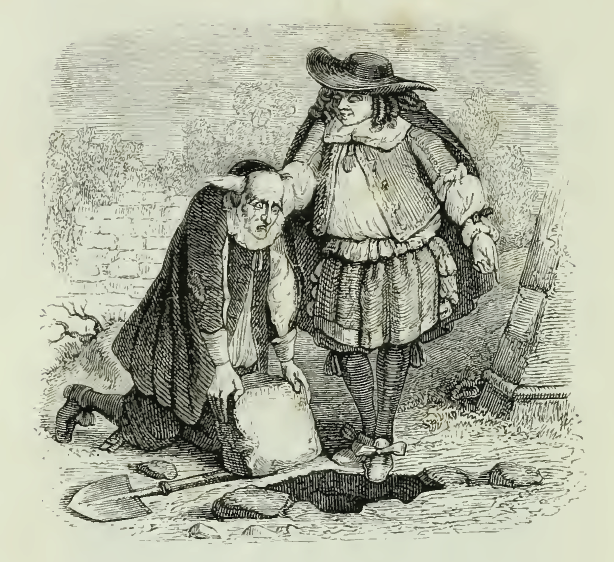
04.20: THE MISER WHO HAD LOST HIS TREASURE.
Tis use that constitutes possession.
I ask that sort of men, whose passion
It is to get and never spend,
Of all their toil what is the end?
What they enjoy of all their labours
Which do not equally their neighbours?
Throughout this upper mortal strife,
The miser leads a beggar's life.
Old Aesop's man of hidden treasure
May serve the case to demonstrate.
He had a great estate,
But chose a second life to wait
Ere he began to taste his pleasure.
This man, whom gold so little bless'd,
Was not possessor, but possess'd.
His cash he buried under ground,
Where only might his heart be found;
It being, then, his sole delight
To ponder of it day and night,
And consecrate his rusty pelf,
A sacred offering, to himself.
In all his eating, drinking, travel,
Most wondrous short of funds he seem'd;
One would have thought he little dream'd
Where lay such sums beneath the gravel.
A ditcher mark'd his coming to the spot,
So frequent was it,
And thus at last some little inkling got
Of the deposit.
He took it all, and babbled not.
One morning, ere the dawn,
Forth had our miser gone
To worship what he loved the best,
When, lo! he found an empty nest!
Alas! what groaning, wailing, crying!
What deep and bitter sighing!
His torment makes him tear
Out by the roots his hair.
A passenger demandeth why
Such marvellous outcry.
'They've got my gold! it's gone—it's gone!'
'Your gold! pray where?'—'Beneath this stone.'
'Why, man, is this a time of war,
That you should bring your gold so far?
You'd better keep it in your drawer;
And I'll be bound, if once but in it,
You could have got it any minute.'
'At any minute! Ah, Heaven knows
That cash comes harder than it goes!
I touch'd it not.'—'Then have the grace
To explain to me that rueful face,'
Replied the man; 'for, if 'tis true
You touch'd it not, how plain the case,
That, put the stone back in its place,
And all will be as well for you!'
[more info]
Tis use that constitutes possession.
I ask that sort of men, whose passion
It is to get and never spend,
Of all their toil what is the end?
What they enjoy of all their labours
Which do not equally their neighbours?
Throughout this upper mortal strife,
The miser leads a beggar's life.
Old Aesop's man of hidden treasure
May serve the case to demonstrate.
He had a great estate,
But chose a second life to wait
Ere he began to taste his pleasure.
This man, whom gold so little bless'd,
Was not possessor, but possess'd.
His cash he buried under ground,
Where only might his heart be found;
It being, then, his sole delight
To ponder of it day and night,
And consecrate his rusty pelf,
A sacred offering, to himself.
In all his eating, drinking, travel,
Most wondrous short of funds he seem'd;
One would have thought he little dream'd
Where lay such sums beneath the gravel.
A ditcher mark'd his coming to the spot,
So frequent was it,
And thus at last some little inkling got
Of the deposit.
He took it all, and babbled not.
One morning, ere the dawn,
Forth had our miser gone
To worship what he loved the best,
When, lo! he found an empty nest!
Alas! what groaning, wailing, crying!
What deep and bitter sighing!
His torment makes him tear
Out by the roots his hair.
A passenger demandeth why
Such marvellous outcry.
'They've got my gold! it's gone—it's gone!'
'Your gold! pray where?'—'Beneath this stone.'
'Why, man, is this a time of war,
That you should bring your gold so far?
You'd better keep it in your drawer;
And I'll be bound, if once but in it,
You could have got it any minute.'
'At any minute! Ah, Heaven knows
That cash comes harder than it goes!
I touch'd it not.'—'Then have the grace
To explain to me that rueful face,'
Replied the man; 'for, if 'tis true
You touch'd it not, how plain the case,
That, put the stone back in its place,
And all will be as well for you!'
[more info]
No comments:
Post a Comment